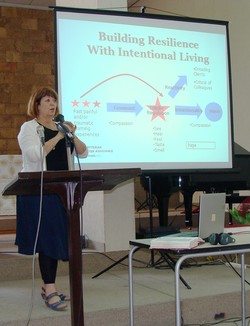Heavy snow, flooding, wildfires, earthquakes and tornadoes. Depending on where you live, chances are you have experienced one of these over the course of the year. The disasters in 2015 have cost communities billions of dollars in lost homes, businesses and services. Support organizations have been working non-stop to help families settle into temporary shelters while their damaged homes are being repaired.
The devastating loss of life and property, and the challenging work of recovery can be emotionally and spiritually costly and leave a lifetime of emotional scars. Without good self-care and appropriate support, many may never fully recover. For years, Presbyterian Disaster Assistance has provided financial and personal support to impacted communities around the world. But PDA is also committed to helping those who minister to people in need.
The Rev. Dr. Laurie Kraus, PDA coordinator, together with Florida pastors the Rev. Dr. Jim Kirk and the Rev. Dr. Bruce Wismer, have led the effort to help support groups, ministers and other caregivers who suffer compassion fatigue.
“We didn’t at first realize that caregivers, therapists, pastors, nurses, doctors, emergency responders or those who witness and listen to stories are impacted as well,” said Kraus. “The body tightens up after you hear about these experiences all day long.”
Kraus said that leaders in response and recovery assume additional responsibility and work in the wake of disaster and sometimes neglect to emotionally process what they see and hear on a daily basis. The result is compassion fatigue.
“We don’t do what we need to do to process those images and stories,” said Kraus. “We become sick, numb or dismissive and develop signs of avoidance. Compassion fatigue is a combination of chronic secondary traumatic stress (hearing and carrying too many stories of trauma) and burnout. Burnout comes when we perceive or have a perception that the demands on us outweigh the resources we have to meet them.”
Kraus knows firsthand, having served as a pastor in Florida when Hurricane Andrew hammered the state in 1992. The Category 5 storm was the worst to hit the state in nearly 60 years. Approximately 35 percent of Kraus’s congregation was displaced, there was damage to the church itself and many people were out of their homes for up to two years.
It was during the recovery effort that Kraus received on-the-job training in disaster assistance and discovered the emotional and physical toll it can take on those who provide that care.
“We are working as hard as we can while continuing to perform our regular pastoral functions,” said Kraus. “We are rebuilding homes, developing programs for kids, administering money and making reports. That added 20 hours of work to what was already a full-time load.
As a result, Kraus said caregivers in that role often stop taking care of themselves and their families can feel neglected or unappreciated. She added that when someone is in a role of support, they cannot always integrate those experiences for themselves.
“When you are in a rut and feel overwhelmed, instead of treating it with healthy engagements, we go into ditch behavior,” she said. “However, if you treat the symptoms, these issues are preventable and you can return to full function and a joyful life.”
Kraus and her colleagues have spent several years providing training on compassion resilience, explaining to church leaders and volunteers how the brain works and what can happen to them as they deal with their community’s ordeal.
“If during a disaster response, we become aware that we are likely to tense up or become overwhelmed, we urge leaders and caregivers to sit down with someone they trust and tell them what they’re experiencing,” said Kraus. “What we’ve done is try to detach ourselves. If we think we can always be objective and don’t recognize the signs, we are setting ourselves up for compassion fatigue.”
Kraus says there are several practices pastors and other caregivers can utilize to avoid compassion fatigue.
- Learn to pay attention to self-regulation. Pay attention to where and when you tense up and put your sympathetic nervous system on alert.
- Learn to relax your body. Check in with yourself to ensure you are physically and mentally sharp to handle the stress.
- Practice mission intentionality. Knowing why you are here and what principals do you want to practice.
- Understand your role. The workplace is a where you practice your mission and will always demand more than you can give. You should understand that you can never do more than your best.
- Seek those you trust to share experiences. Choose two or three people that will listen to your frustration and pick up on your behavior signals.
- Practice self-care. Involve yourself in some time of physical or creative activity such as exercise, singing or dancing. Be sure you get enough sleep and eat healthy.
PDA has conducted compassion fatigue training in areas impacted by natural disaster as well as war. Kraus recently participated in training for pastors and church leaders from Syria and Iraq who are struggling to meet the needs of Christian immigrants seeking to escape death at the hands of extreme terrorists.
-----
Staff is currently working to schedule trainings and support for 2016. For more information, please visit the PDA website.

